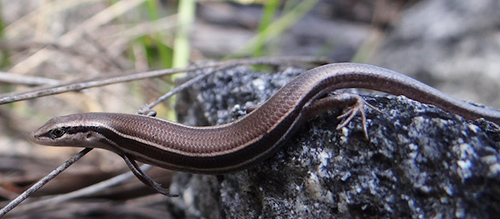Lizard cognition has experienced something of a resurgence in the last few years. To get up to speed, take a look at a previous post summarising most of the recent published work. In a new paper published online in Behavioral Ecology and Sociobiology, Ben Clark, Dan Noble and Martin Whiting from the Lizard Lab and Josh Amiel and Rick Shine from the University of Sydney report the results of a cognition study on the lizard Bassiana duperreyi. Here, we first tested the ability of hatchling three-lined skinks incubated at ‘hot’ and ‘cold’ temperatures to solve an instrumental (motor) task before assessing their ability to learn colour associations in a multi-stage instrumental task. This work is significant because it tackles cognition in very young hatchling lizards, just a few weeks old. Furthermore, we test for an influence of incubation environment (‘hot’ vs ‘cold’) on cognitive ability in a species with genetic plus temperature-dependent sex determination.’Hot’ incubated lizards fared better in cognitive trials. While the test was a motor task and therefore dependent on physically moving a cover object, which might give the ‘hot’ treatment individuals an advantage because they were larger, there was quite a bit of overlap in body size and body condition between the two groups. Therefore, size and body condition could not explain the better performance of ‘hot’ incubated individuals in this cognitive test. The ‘hot’ incubated lizards went on to successfully complete several cognitive tests that depended on learning colour discrimination and culminated in a choice-reversal, in which the reward was switched to a different coloured dish. One caveat of this study is that we uncover high variability in learning ability, which is a feature of many species, including of course, humans. Our study demonstrates that lizards are capable of learning relatively complex tasks and adds to a growing body of literature that shows that lizards are far smarter than many previously believed.

Here is the paper’s abstract:
The ability of an animal to acquire, process and learn from information in their environment is thought to be fundamental to fitness. We currently have a poor understanding of the learning ability of young animals within the first few months of their life, the types of learning they use and the extent of their learning ability. Furthermore, an animal’s developmental environment, such as nest incubation temperature, may profoundly influence motor and cognitive skills. We first tested the ability of hatchling three-lined skinks (Bassiana duperreyi) incubated at ‘hot’ and ‘cold’ temperatures to solve an instrumental (motor) task before assessing their ability to learn colour associations in a multi-stage instrumental task, with a choice reversal. While 53 (88.3 %) lizards successfully completed the training phase, 14 (46.7 %) of the ‘hot’ incubated and none of the ‘cold’ incubated lizards successfully completed the instrumental task. Thirteen of these lizards rapidly learnt to discriminate colours, and this culminated in eight individuals successfully completing a choice reversal. Hatchling B. duperreyi demonstrated surprisingly rapid learning, and these results highlight the potentially important role of cognition during development and ultimately, in fitness.
Clark, B.F., J.J. Amiel, R. Shine, D.W.A. Noble, and M.J. Whiting. Behavioral Ecology and Sociobiology. Colour discrimination and associative learning in hatchling lizards incubated at ‘hot’ and ‘cold’ temperatures. 10.1007/s00265-013-1639-x. PDF

